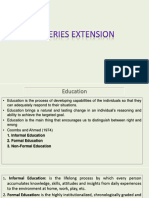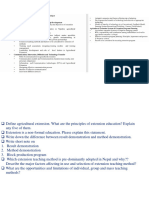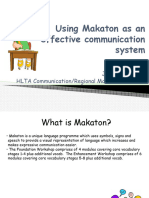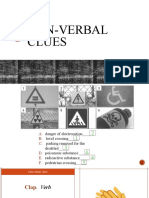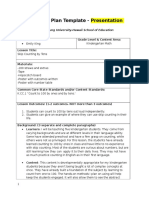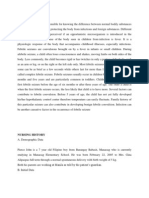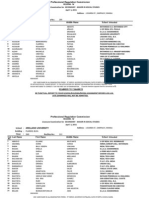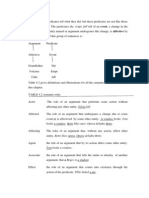Module 1
Extension Education Concepts, Philosophy, Principles and Objectives
Introduction
This module will focus on the different extension education concepts, philosophy, principles and
objectives and the scope or coverage of extension which will be used most of the time in the
discussion of this course.
Learning Outcomes:
At the end of the module the students should be able:
1. To state the concepts of education, extension and agricultural extension;
2. To identify and differentiate the types of education;
3. To explain the philosophy and principles of extension;
4. To analyze the objectives of extension;
5. To discuss the scope or coverage of extension.
Learning Contents:
Education Concepts
Education is concieved as a lifelong process of learning. It is a continuing process of bringing
about desirable changes in the behavior of human beings which involves a variety of methods and
sources. This starts from earliest infancy through adulthood. The desirable changes in the behavior
of the people include increased knowledge, new skills or better attitudes. This definition connotes
that education can be equated with learning regardless of where, how or when the learning occurs.
Three Modes of Education
1. Informal education - is the life long process by which every person acquires and
accumulates knowledge, skills, attitudes and insights from daily experiences and exposure
to the environment, at home, at wor televisions. ork, at play from the example and attitudes
of family and friends, from travel, reading newspaper and books or by listening to the radio
or viewing films or televisions. Generally, informal education is unorganized and often
systematic, yet it accounts for the great bulk of any person’s total lifetime learning
including that of even a highly schooled person.
� 2. Formal education – refers to the highly institutionalized, chronologically graded and
hierarchically structured “education system” starting from the primary school and reaching
the university education. The basic education elementary and high school, post-secondary
and tertiary education belong to formal education.
3. Non-formal education – refers to any organized, systematic, educational activity carried
on outside the framework of the formal system to provide selected types of learning to
particular subgroups in the population, adults as well as children. Thus defined, non-formal
education includes for example agricultural extension and farmer training programs, adult
literacy programs, occupational skill training given outside the formal system; youth clubs
with substantial educational purposes and various community program of instruction in
health, nutrition, family planning, cooperatives and the like.
Differences between the formal and non-formal type of education
Bases of Comparison Formal Non-formal
Educational Objectives For future Immediate application
application/preparation for life
Groups Generally youths Youth and adults,
served/clientele/audience heterogeneous
Curriculum Fixed curriculum or course of Based on people’s needs, no
study fixed curriculum or course
of study
Place/venue Classroom/schools Where the people are,
anywhere in the community
Sponsorship National government and other National government and
sources other sources
Certification Confers degree and diploma Gives certificates
Concept of Extension
Extension means to extend, to spread or to disseminate useful information and ideas to rural people
outside the regularly organized schools and classrooms. It may also be defined as the extending of
or a service or system that extends the educational advantage of an educational institution to
persons unable to avail of a formal education.
The above concept of extension connotes providing people with educational opportunities and
services outside the boundaries of the school. This is expressed in the philosophy of one state
university in the Philippines which states: “The ultimate measure of the effectiveness of any
institution of higher learning is its contribution to and impact on the educational, economic, social,
cultural and political well-being and environmental conciousness of the people it serves.”
�Conceptually, the role of extension is to bridge the gap between the research system and the client
system.
Research Extension
System Delivery Client System
System
Extension, therefore, is a type of intervention focused on education and training and related
services, designed towards helping people to help themselves. Operationally, this means that
people with initial assistance from extension system through their own effort need to develop self-
reliance by acquiring new knowledge and skills, attitudes, new insights, appreciation and
perception that will help them get through and arrive at solutions to their own problems.
As one author puts it, “extension is a well-planned program of bringing the results of agriculture
research and technology to the rural people in many ways in order to bridge the gap between the
scientist and the farmer.”
In other words, all forms of extension take education to the rural people. Extension takes to the
rural people that form of educational assistance appropriate to their needs. It is a process of
bringing about desirable changes in an individual such as knowledge, skills and attitudes. Thus,
the term extension education.
Similarly, the concepts of agricultural extension imply effecting change, changes in behavior of
the rural people presumably resulting more specifically in improved agricultural production, better
living and improvement of a nation’s economy. Agricultural extension is highly regarded as a
system of educating and training the rural people to develop skills and abilities in farming,
homemaking and youth building.
Extension services refers to the provision of training, information and support services by the
government and non-government organizations to the agriculture and fisheries sectors to improve
the technical, business and social capabilities of farmers and fisher folks. The concept of extension
in the Agriculture and Fisheries modernization Act of 1997 (RA 8435) emphasizes the services to
be provided in order to improve the status of farmers and fisher folks.
�Philosophy of Extension
Guralnik defines philosophy as the general principles of a field of knowledge. It is also defined as
a body of principles that governs the conduct of human activity. The philosophy of extension
serves as compass to give direction to extension activities.
There are some philosophical qualities of education that apply to extension which we may
adopt, believe and practice.
1. That education is the most permanent way through which to bring about change; extension
is fundamentally education.
2. The effective extension education must be based upon freedom of choice, voluntary
participation and that participation in extension activity functions best when democratic
processes are applied.
3. That extension must be a form of education that teaches people to do things, not a system
of doing things for people.
4. That idea must be put to work for the betterment of the huaman race. Pusuing knowledge
for its own sake is like keeping tools locked up in tool chest. Tools must be used. Like
knowledge must be put to work.
5. That knowledge can be transferred through a process of “man helping his fellowman.”
With this, we must also accept a fundamental belief in the ability of people to help
themselves and in the fact that all levels of society can learn to make decisions.
6. That there is no fundamental difference in the intellectual abilities of any race or sex, if
given a chance to acquire education and if helped in the application of knowledge. This
does not mean difference in individuals. However, all people everywhere can, when given
the right stimulus and incentives, improve their capacity to put knowledge and skills to
practical use.





